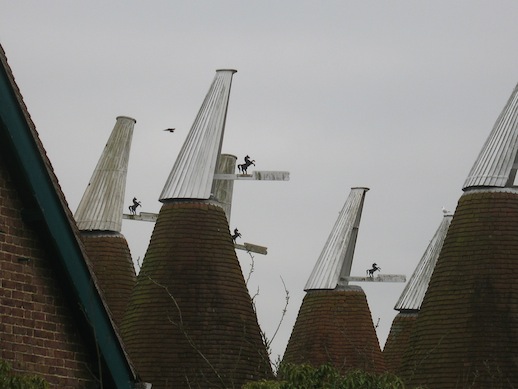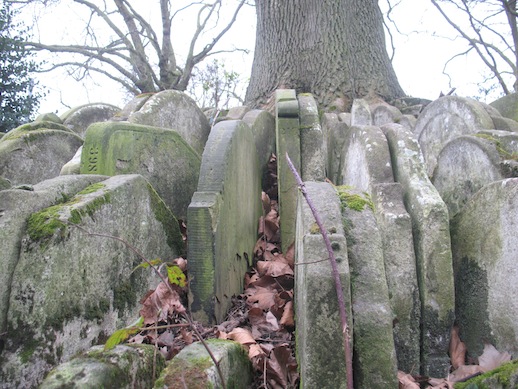A walk from Maidstone to Bearsted, undertaken by the author on Saturday 2 March 2013.
Words and pictures: Richard Shepherd.
I suppose I had persuaded myself that this was work. A three-poet walk: Hardy, Thomas and Blunden (put like that they sound more like chartered accountants than poets).
Though more widely known as a novelist, Thomas Hardy turned to poetry in later life. His first volume, Wessex Poems (1898), was published when he was 58. Edward Thomas and Edmund Blunden are both poets associated with the First World War. Thomas is widely regarded as an important and influential poet today. Whilst Blunden’s poems often turn up in anthologies his reputation as a poet has fluctuated in recent decades. His prose account of his war time experience as a Second Lieutenant in an infantry battalion on the Western Front, Undertones of War (1928) is regarded, along with the autobiographical writings of Siegfried Sassoon and Robert Graves, as one of the definitive memoirs of the war.
My interest in Blunden is personal. He survived the battle at the Ancre on 3 September 1916 in which my great uncle was killed. It was to Blunden’s writings I turned when the buff folders in the National Archives proved as lifeless as their namesakes in the blood and mud across the channel.
I recently found out that Kent History and Library Centre in Maidstone had a lot of Edmund Blunden material. Maidstone is only a few miles away from Yalding, Blunden’s childhood home (from 1900) and life-long inspiration. I thought a visit to the archive might neatly combine with a short stroll that had long been on my to do list. Bearsted, a few miles south of Maidstone town centre at the foot of the North Downs, was where Edward and Helen Thomas moved in 1901 with their baby son, Merfyn. It was their first home outside London.
The Hardy link? Blunden became friendly with Hardy when he was introduced by mutual friend Siegfried Sassoon. When Hardy died in 1926 his widow gave Blunden Thomas Hardy’s own copy of Edward Thomas’s Poems.
The strange thing was I had forgotten about our own Hardy connection until I found myself cutting through Old St Pancras church yard on my way to the station. Around about 1865 the writer – then a trainee architect – supervised the reconfiguring of the churchyard which was partly to be lost with the expansion of the adjacent railway line. The jumble of mossy gravestones huddled round the Hardy Tree felt auspicious. I didn’t need sunshine. I would be more than happy with bones.
In the Kent history centre I only had time to call up a couple of items. I chose a short pamphlet from 1964, Guest of Thomas Hardy, in which Blunden recalled a visit to Hardy’s Dorset home, Max Gate, in July 1922. Hardy at eighty-two was then the grand old man of English letters. Blunden, twenty-five and a prize-winning poet but not yet a famous one, recalled feeling rather anxious beforehand but quickly establishing a rapport over Shelley and the war. Hardy’s dog, Wessex, took an immediate liking to the young writer – an unusual honour apparently.
A detail absent from the official pamphlet, but mentioned in Barry Webb’s biography of Blunden was that one of the things that most impressed the young poet was the old man’s ability to take a piss without pausing in conversation or breaking his pace. That might be poetic licence. My own attempts to replicate the trick have at any rate proved dismal.
My walk took me from the betravelodged and concrete-coffined Medway, through streets and amenity parkland to a green corridor through suburban Maidstone. Along the River Len alders were in full catkin guise, the water clear in its sandy bed. Fenced and hedged back gardens loomed mysteriously above the sunken road. Dog walkers, couples, children: this was the place where — threw his scooter in the river last year. The sort of walk in other words that could only be walked on a Saturday in catkin time. Even in grey hand numbing cold, a triumph of ambulatory optimism over stubborn experience.
Bearsted manages to maintain a village feel despite being wrapped in the over-protective arm of its big sister. This was the place that the Thomases called home from 1901 to 1904.
Helen Thomas recalled her horror on arriving at their first home in the village, Rose Acre – a dismal cottage a mile outside the centre – even further from any romantic notions of a country cottage she might have entertained. But she enjoyed the view of the Pilgrim’s Way and the downs. There was a cherry orchard next door and – whatever other problems they had (the depth of Edward’s depression was becoming apparent) it was at least spring.
In the archive I read the short collection, Rose Acre Papers, (1904). It’s really interesting to go back and read the early work of a writer who you’ve grown to love in a later incarnation (not much later of course given that he died in 1917). There are glimpses of the writer Thomas would become and whom the war robbed us of so tragically early. Rain – the title of the fourth essay – in particular is a subject that would he would return to throughout his writing and find its mature voice in the poems and the prose poetry of The Icknield Way.
In another paper Cleopatra’s (the author’s cat) opinion of her new home in the Kentish countryside is not ameliorated by the spring and on a trip back to London she runs off to her old empty home “fifth floor left.” She is retrieved but pines away and the author has her stuffed.
Cleopatra’s feeling that the path not chosen would probably have been better is very Edward Thomas – which is the same as to say very human. But whether he had moments of doubt or not, the country boy from Wandsworth never did live in a city again.
Blunden singles out Hardy’s poem, “Friends Beyond,” as one that meant a lot to him before their meeting. It is a graveyard meditation but drawn as much from a folk tradition as a poetic one. A sort of Uncle Tom Cobbley meets Thomas Gray. It would have had a ready appeal to the young poet for all sorts of reasons. Blunden at age 25 had more friends beyond than most people in more peaceful times would gather in a lifetime. He had also endured the loss of a baby daughter – a tragedy at any time but particularly cruel in 1919. He was, he felt, a man grown old before his time.
WILLIAM DEWY, Tranter Reuben, Farmer Ledlow late at plough,
Robert’s kin, and John’s, and Ned’s,
And the Squire, and Lady Susan, lie in Mellstock churchyard now!
“Gone,” I call them, gone for good, that group of local hearts and heads;
Yet at mothy curfew-tide,
And at midnight when the noon-heat breathes it back from walls and leads,
They’ve a way of whispering to me—fellow-wight who yet abide—
In the muted, measured note
Of a ripple under archways, or a lone cave’s stillicide:
In 2012 the poet Paul Farley took a ride in the police helicopter (for Radio 4) from Loughton over the night time capital. He was fascinated by the way that in the viewfinder of a heat-seeking camera, the cemetery headstones, having retained the noon-heat, appeared to signify life.
Part of the particular cruelty of the first world war was that whole communities joined up and died together. This too I feel would have been part of the poem’s appeal to Blunden.
So the poem continues but I must leave the ripple mid stream. My book is not being written and I’ve not even thought about finding a job and you can’t eat poetry. But when the cider bottle falls behind the ash tree I might yet draw warmth from the higgled stones.

